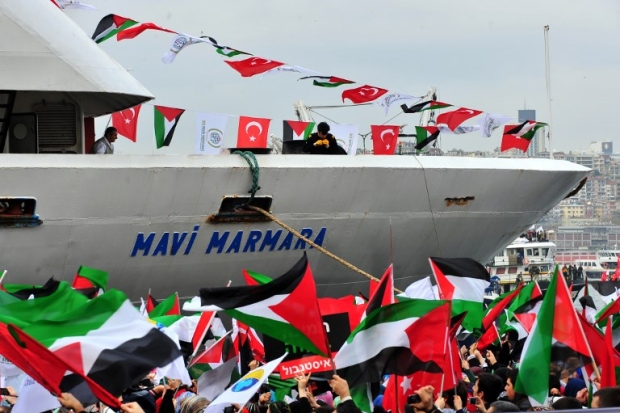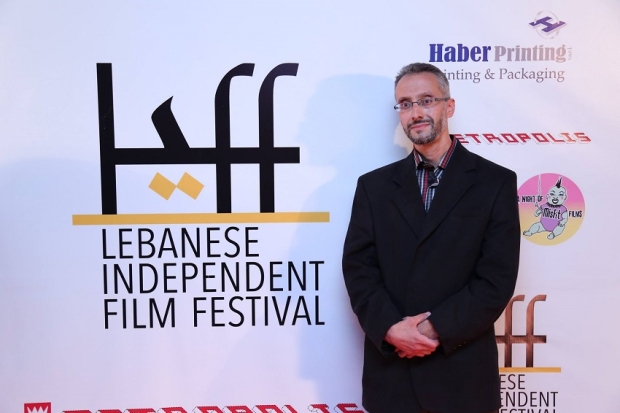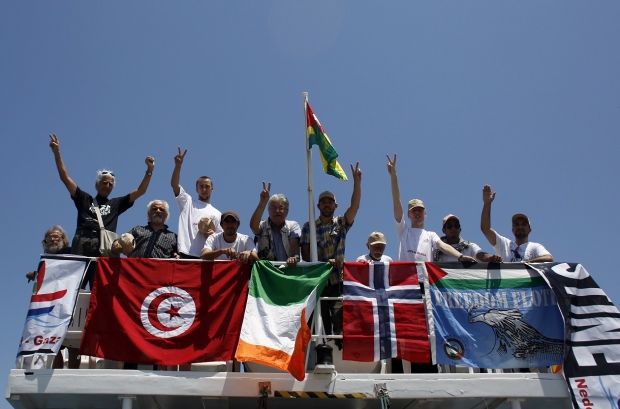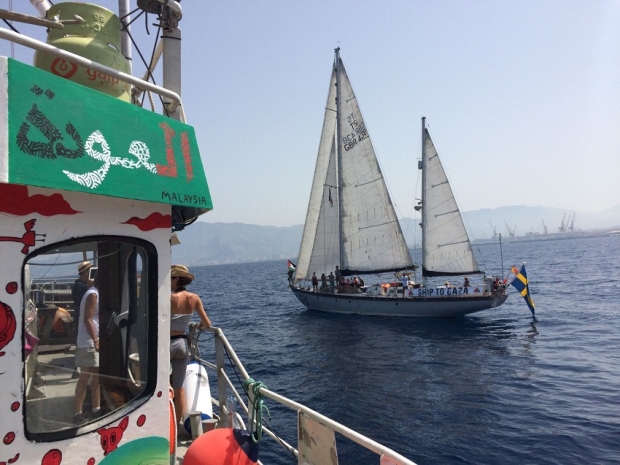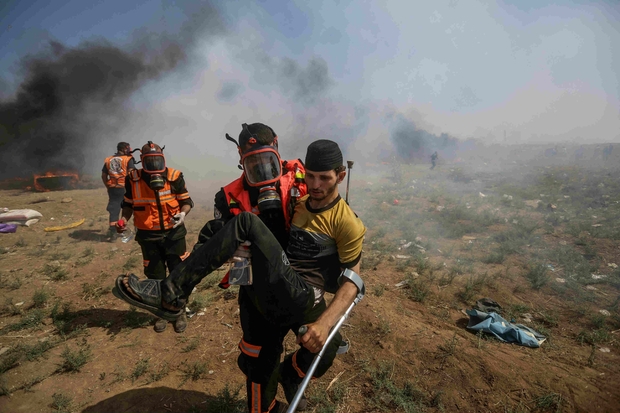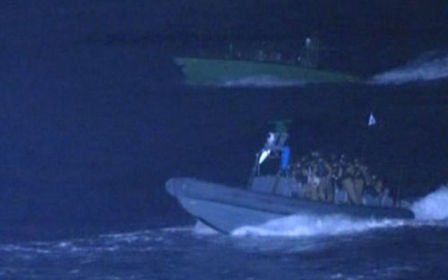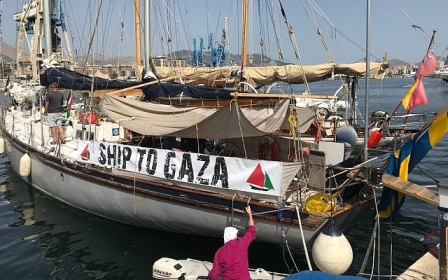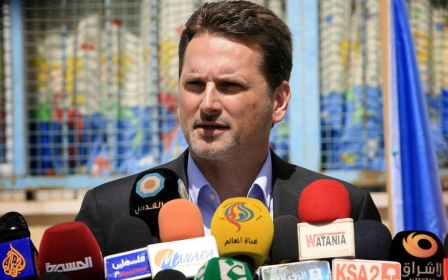Remembering Mavi Marmara: 'We really believed we would reach Gaza'
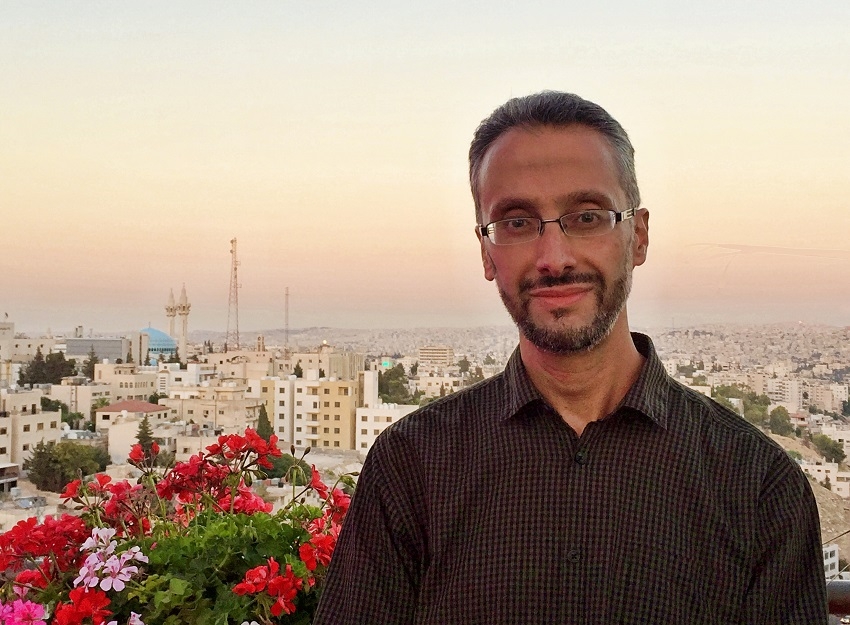
AMMAN - In an outdoor restaurant on a warm evening in Amman, Jordan, Palestinian-Canadian activist and filmmaker Rifat Audeh talks to Middle East Eye about how he came to be a survivor of the deadly attack on the Mavi Marmara aid flotilla that was headed for Gaza in 2010.
The life-changing event led him to produce his award-winning documentary, The Truth: Lost at Sea, which tells the story of a fateful journey that began as a mission to help people in Gaza but ended in the death of 10 activists killed by Israeli forces.
The story is more than recent history: the infamous assault by Israeli forces on the flotilla did not deter future efforts by human rights activists to reach Gaza by sea in the face of Israel's naval siege, including a flotilla that has set out in recent weeks.
During a dinner of traditional Middle Eastern dishes such as hummus, foul and tabbouleh, Audeh, who is softly spoken yet animated, becomes more serious as he recounts the details of what happened that night.
On 22 May 2010, the Mavi Marmara set sail from Sarayburnu port, Istanbul, in an attempt to breach the Israeli blockade on Gaza, which has been enforced since 2007.
One week later, it joined the rest of the aid flotilla, comprising three passenger and three cargo ships carrying essential humanitarian aid and 700 activists, in the Mediterranean Sea south of Cyprus.
In 2015, the UN warned that Gaza could become uninhabitable by 2020 if current economic trends and the blockade persist.
Nine days after the aid flotilla set sail in 2010, Israeli commandos attacked the Mavi Marmara vessel in an effort to prevent it from progressing further, despite it still being in international waters. Nine activists were killed and a 10th activist later died as a result of his injuries.
People were singing and exchanging stories. We had come together from 35 different countries in the shared hope of helping others. It felt as though we were one big family
- Rifat Audeh, filmmaker
"Nobody was expecting it would end up the way that it did," says the 45-year-old. "I think we all really believed we would reach Gaza."
Audeh describes the atmosphere prior to the attack on board as jubilant.
"People were singing and exchanging stories. We had come together from 35 different countries in the shared hope of helping others. It felt as though we were one big family," he says.
The situation began to grow tense the day before the attack. According to Audeh, Israeli authorities expanded the size of the ocean military zone to prevent the flotilla from getting near Gaza. Avigdor Lieberman – Israel's defence minister at the time and the current foreign minister – said that the flotilla was a "provocation," adding that it would be prevented from reaching Gaza "at any cost".
"But even then we thought the Israelis would just try and scare us, or hinder our journey - not kill 10 people," says Audeh.
The attack
He describes a terrifying chain of events that took place at around 4:30am on 31 May.
"It was late at night and completely dark. Initially, Israeli soldiers attempted to board the boat via Zodiac [inflatable] boats but we attempted to stop them by spraying water on them," he says.
"We were just trying to defend ourselves by the little means we had."
Audeh recalls seeing soldiers rappelling down ropes from helicopters "firing indiscriminately".
At that point I thought they were going to shoot, so I just said a prayer and waited
- Rifat Audeh, filmmaker
"There was a moment, just as the soldiers began to board the boat, when I was sitting on a bench looking out to sea and a gun laser sight spot was aimed at my body for quite a few minutes. At that point I thought they were going to shoot, so I just said a prayer and waited," he says.
But the shot never came. Instead, Audeh recalls being thrown to the ground and pinned down by Israeli soldiers with such force that they broke his ribs. They tied his hands behind his back so violently he thought they would break his arms, before they blindfolded him.
"Even after they had gained control, the soldiers were beating the activists, not allowing any of us access to food or water, nor the use of the bathroom," he says.
"After they attacked and arrested us, we were held incommunicado. When the Canadian embassy representative visited me in prison and told me the world had seen what happened, it was such a relief."
Salvaged footage
Audeh managed to salvage video footage filmed on board prior to and during the bombardment, allowing him to produce the independent documentary, which he completed at the end of last year.
"I joined as an activist, but I was also filming as much as I could because I was hoping to make a documentary about the trip. However, following the attack, the film took a very different turn," says the former mechanical engineer.
Even after they had gained control, the soldiers were beating the activists, not allowing any of us access to food or water, nor the use of the bathroom
- Rifat Audeh, filmmaker
According to Audeh, Israeli soldiers confiscated filming equipment and media storage devices during the onslaught. Audeh had his camera taken from him and it was never returned.
Still, Audeh managed to obtain footage which had not been confiscated by the Israeli soldiers either because it was smuggled out or by sheer luck.
He managed to reclaim four out of 10 tapes worth of footage he had filmed prior to the attack. The tapes were in his bag that had been confiscated and returned at a later date. He assumes the remaining tapes were not taken because they were simply not seen.
The filming of the attack itself was carried out by a member of the Cultures of Resistance Network. The group's cameraman managed to smuggle out a memory card containing the footage.
Unreasonable force
Following the attack, the Israeli government claimed that militants on board the Mavi Marmara were responsible for the violence, alleging that they "were preparing to attack, to kill and to be killed".
Israeli soldiers attacked us in the dark of the night in international waters, yet they claimed they were acting in self-defence
- Rifat Audeh, filmmaker
However, a report published in 2011 by the United Nations, following an investigation into the attack, concluded the substantial force used by Israeli authorities had been "excessive and unreasonable". It deemed there had been "significant mistreatment of passengers".
It also stated: "No satisfactory explanation has been provided to the panel by Israel for any of the nine deaths. Forensic evidence showing that most of the deceased were shot multiple times, including in the back, or at close range has not been adequately accounted for in the material presented by Israel."
Audeh says he felt it was his duty to reveal what really took place on that tragic night.
"Israeli soldiers attacked us in the dark of the night in international waters, yet they claimed they were acting in self-defence," he says.
Awards and accolades
The documentary, currently being shown at film festivals around the globe, has won several awards including the Audience Award at Italy's Al Ard international documentary film festival in March. Last month, it won the Mediterranean Special Award at the Lebanese Independent Film Festival as well as attaining an "Honourable Mention" at the Canadian film festival, Yes! Let's Make A Movie.
When the Canadian embassy representative visited me in prison and told me the world had seen what happened, it was such a relief
- Rifat Audeh
"It's been a monumental task," he says. "I had to teach myself from scratch how to make a film. I was faced with logistical challenges, including acquiring the footage from the other activists and journalists who were onboard, getting permissions to use their work as well as to use footage from other documentaries and subtitling footage."
The film, which cost several thousand dollars to make, was completely funded from Audeh's own pocket.
"There was also the emotional aspect. I had to relive the experience over and over again as I was making it. It raised big questions for me: why didn't I do more, could I have done more? It's certainly been a challenge."
28 ports to Gaza
Since 2008, activists from all over the world have sailed 31 boats in attempts to challenge the Israeli naval blockade on Gaza.
"The most important thing is to persist in the fight for human rights. History is full of examples where the weaker side has prevailed against the much stronger side because of their persistence and belief," says Audeh. "Before 2010, a lot of people didn't know what was going on in Gaza and it's important to continue with these attempts to break the blockade to carry on raising awareness."
[The documentary] raised big questions for me: why didn't I do more, could I have done more?
- Rifat Audeh
In the most recent Gaza Freedom Flotilla attempt, four boats set sail from Scandinavia in May. On 29 July, all communication was lost with the lead boat. Israeli forces had seized the vessel despite it being in international waters. Once on board the Al Awda (The Return), the authorities arrested the 22 passengers and crew. The boat was then towed into Israeli's Port of Ashdod.
One of the other boats was damaged during a storm and had to return to port in Palermo, Sicily, while the fourth boat never left Sicily due to technical issues.
Torstein Dahle, head of the group Ship to Gaza Norway, told Reuters that the captain of the Al Awda boat had been struck on the head by Israeli soldiers who ordered him to sail for Israel, but no one was seriously injured.
As we get closer to our goal, we are all very aware and emotional as we know we are part of this amazing action for human rights
- Elle Hansson, onboard the Freedom boat
Communication with Freedom, the last remaining boat, was lost at around 8pm local time on Friday. The FFC confirmed on Saturday that Israeli authorities boarded Freedom shortly after communication went down.
Speaking to MEE before the Al Awda boat was captured and communication was lost, 32-year-old Ellen Hansson, who was on board the Swedish-flagged yacht Freedom, says emotions were running high as they covered the final nautical miles.
"As we get closer to our goal, we are all very aware and emotional as we know we are part of this amazing action for human rights," says Hansson, a Swedish national.
According to Hansson, the journey had not been without its challenges but the atmosphere was a positive one.
"Inevitably there have been many obstacles along the way, such as weather conditions, technical issues on the boats, repairs needed, as well [as] political opposition in both Paris and Marseille."
In addition to the awareness campaign they promoted in each country they passed through, they were also carrying medical supplies urgently needed following demonstrations at the separation fence between Gaza and Israel in which at least 157 Palestinian protesters were killed and more than 16,000 were wounded. There have been no Israeli fatalities.
Additionally, the intention of the activists was to donate the boats to the local fishermen on their arrival in Gaza.
With a besieged economy and a lack of jobs, 80 percent of Gaza's population is dependent on aid.
"We are tired of having complicit governments allowing this to happen, and tired of the fact the world allows them to get away with it. But we are not tired of fighting the blockade," says David Heap, a linguistics professor at the University of Western Ontario, who handles the media communications on behalf of the Canadian arm of the organisation.
The 52-year-old believes Audeh's film is key to increasing people's awareness of what is going on in Gaza.
"It's a powerful reminder of how the story changed and how it got distorted," he says.
Middle East Eye propose une couverture et une analyse indépendantes et incomparables du Moyen-Orient, de l’Afrique du Nord et d’autres régions du monde. Pour en savoir plus sur la reprise de ce contenu et les frais qui s’appliquent, veuillez remplir ce formulaire [en anglais]. Pour en savoir plus sur MEE, cliquez ici [en anglais].


